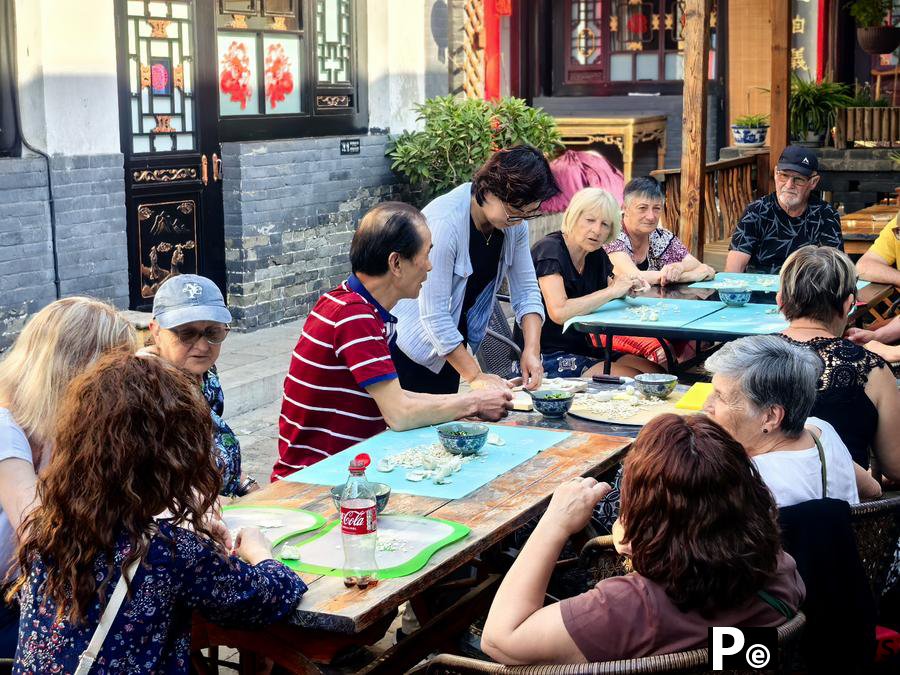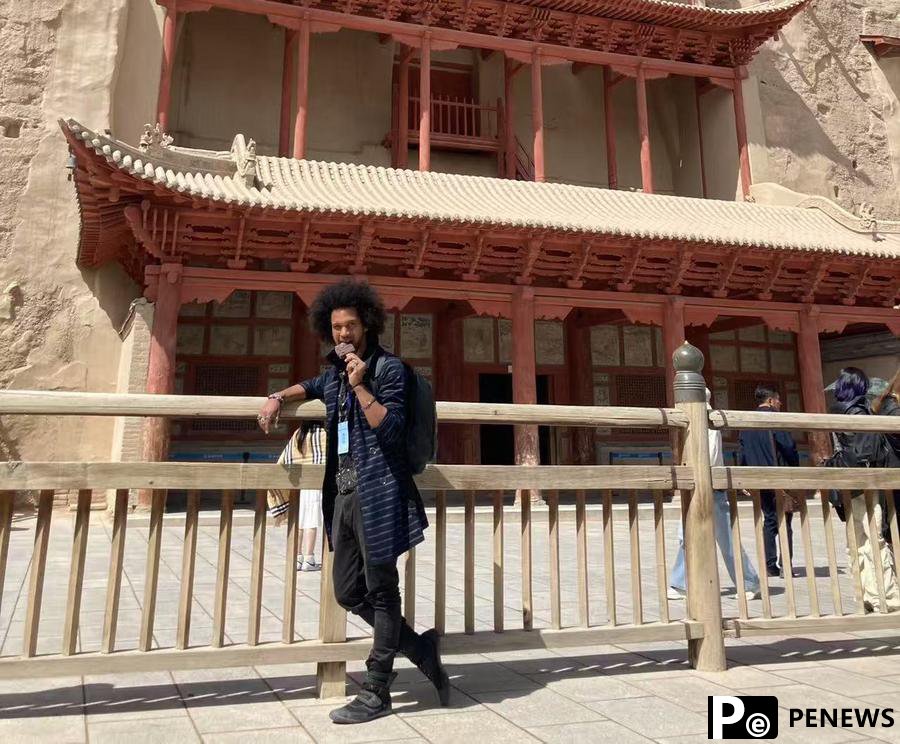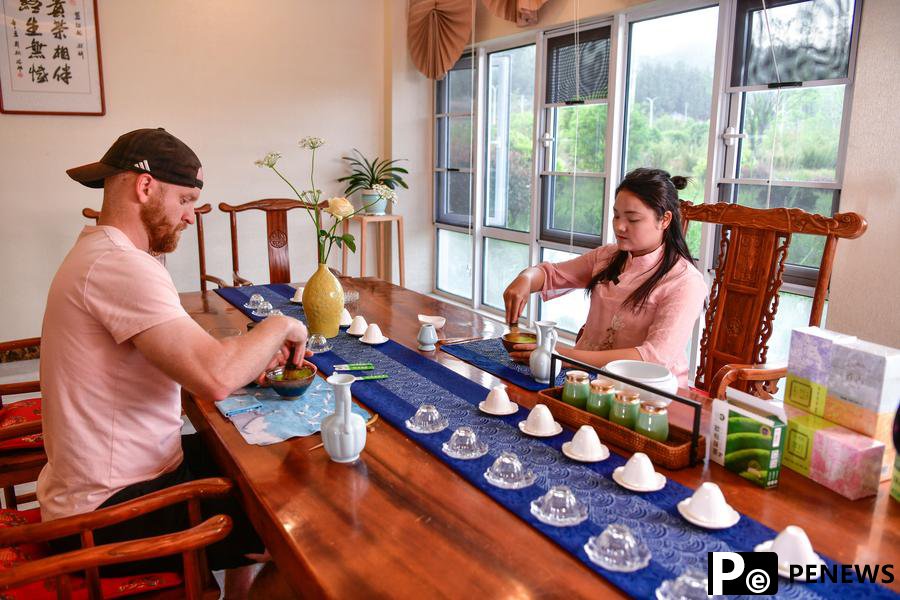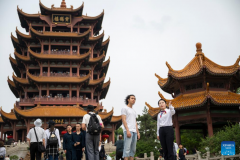Home>>
China's lesser-known destinations draw more inbound tourists(Xinhua) 08:45, May 21, 2025
TAIYUAN, May 20 (Xinhua) -- Basking in the sunshine, John Jammet and his wife sat in the courtyard of a traditional house in the historic Pingyao County of north China's Shanxi Province, with coffee in hand. Their trip seemingly offered them a glimpse into the lives of Chinese back in the day.
"Last night we traveled in the main streets and the lanterns were very beautiful," said the man from France. "What attracted me most were a lot of young girls and boys wearing traditional clothes. It showed that they love their culture and history."
Fascinated by the video game "Black Myth: Wukong," Jammet became interested in the culture behind it, and thus decided to come to China and have a look. The couple carefully planned their trip, with it including China's capital Beijing, Pingyao, the ancient capital Xi'an in northwest China and the picturesque Guangxi Zhuang Autonomous Region in south China, reflecting their quest to see "both modern cities and traditional culture."
"In the Western world, I think there is misunderstanding about China, because our countries are different," he explained. "It is important to see with our own eyes what's the truth about China. For me, China is safe and clean, people are kind and helpful."
At the mention of China, images that immediately jump into the minds of many foreign tourists are normally the Great Wall, giant pandas and the many skyscrapers in the bustling metropolis of Shanghai in east China.
Thanks partly to China's eased visa policies, an increasing number of foreign tourists are now also turning their attention to lesser-known destinations to delve deeper into Chinese history and culture, just like Jammet and his wife.

Foreign tourists learn to make traditional wheaten food at a homestay in Pingyao, north China's Shanxi Province, May 15, 2025. (Photo by Qiao Yan/Xinhua)
OFF THE BEATEN TRACK
As of the beginning of May, China has granted unilateral visa-free entry to people from 38 countries, and has extended its visa-free transit period to 240 hours for travelers from 54 countries.
In 2024, China recorded 64.88 million border crossings by foreign nationals, an 82.9-percent increase year on year. In the first quarter of 2025, this number stood at 17.44 million, up 33.4 percent compared to the same period in 2024.
During the five-day May Day holiday, the most recent vacation in China for family outings and tourism, statistics regarding air ticket bookings on Chinese travel services platform Qunar showed that in addition to the megacities of Beijing, Shanghai and Guangzhou, the lower-tier cities of Chengdu, Xiamen, Nanjing, Chongqing and south China's Haikou were also among the top-ranking destinations for non-Chinese tourists. In addition, hotel bookings made by foreign passport holders in Zhuhai, east China's Qingdao and central China's Wuhan grew by 70, 60 and 50 percent respectively.
Hotels, restaurants and even hairdressers in residential areas not very close to traditional attractions in Beijing are beginning to greet foreign tourists, while small cities and counties are also seeing more inbound visitors.

Zachary Iziah Smith, an American travel blogger, poses for a photo at Mogao Grottoes in Dunhuang, northwest China's Gansu Province, April 11, 2025. (Xinhua)
Kang Mobei is general manager of a shop affiliated to the Gansu Provincial Museum, which sells creative cultural products inspired by items in the museum, like a green fluffy toy based on the iconic copper galloping horse.
Notably, Gansu Province in northwest China is home to many historical sites, including the Mogao Grottoes UNESCO World Heritage Site. During the May Day holiday, she found more foreign tourists in her shop, many of whom came from countries like Australia, Indonesia, Thailand and Japan.
"Some of them had already been to the museum, and a few even showed me pictures they found on social media platforms like 'rednote' when asking for products," said Kang, who observed that some customers had fluffy toys from other creative cultural product shops dangling from their bags.
With overseas customers in mind, the store installed POS machines for international bank cards and carried out language training for their staff.

A foreign visitor (L) learns how to make matcha beverage at a tea industrial park in Jiangkou County, southwest China's Guizhou Province, April 14, 2025. (Xinhua/Yang Wenbin)
EASIER, FASTER, BETTER KNOWN
To meet this increasing demand from foreign customers for niche tourist destinations, Chen Wanni and Chen Min last year founded China Explorer Tour (CET), a tour operating company specializing in authentic food, adventure and cultural-immersion themed retreats and experiences across China.












